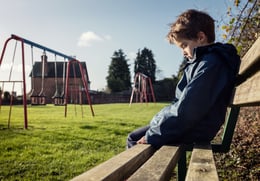 What's the link between trauma and addiction? We’re trying to understand traumatic situations that happen in someone's life and how they may impact substance abuse or addiction. Trauma and addiction can be linked even when there is not an obvious (overt) case of trauma. Learn more from recovery expert and Clearing co-founder Joe Koelzer.
What's the link between trauma and addiction? We’re trying to understand traumatic situations that happen in someone's life and how they may impact substance abuse or addiction. Trauma and addiction can be linked even when there is not an obvious (overt) case of trauma. Learn more from recovery expert and Clearing co-founder Joe Koelzer.
Q: Joe, you've said that many of the participants you treat at The Clearing for addictions and other emotional disorders have experienced one or more traumas in their lives. What's the link between trauma and addiction?
A: Well, I think to start with, we need to back up and say, "What does trauma mean?"
Here's how we think about trauma and how we define it for our participants: It means that the event was traumatic to you. It doesn't mean that it met some third-party definition of trauma. It doesn't mean that there was necessarily a violence of any kind attached to it. It was just shocking. It was shocking to you.
When I experience a [childhood] traumatic event - anything that's traumatic to me - there's an emotional part of me that really gets stuck at that age. It continues to try to relate to the world emotionally with all of the experience and the skills of somebody of that age.
That just doesn't work for us when we're adults, so it causes anxiety and fear and irrational behavior. When similar kinds of events happen to us as adults, then that younger part takes over emotionally and we act out.
You know, we've all seen somebody and thought, "Well, that adult there ... he's acting like an eight-year-old." You know what? He really is an eight-year-old, emotionally, at that particular point in time.
That's what we mean by trauma. We all have issues that were shocking to us. It doesn't mean we didn't have a good childhood. It doesn't mean that things weren't amazingly wonderful. It just means that we all had things that happened to us that were shocking to us and have shaped us emotionally.
And some of that stuff needs attention.
Q: So it really comes down to an understanding of the true definition of trauma?
 A: Yes, it does, because most folks think that trauma means that they had to have suffered some major abuse … maybe a sexual abuse or some kind of violence.
A: Yes, it does, because most folks think that trauma means that they had to have suffered some major abuse … maybe a sexual abuse or some kind of violence.
Those things certainly happen; the statistics are just really eye-opening and incredible. But it's not required. In any life there are a lot of events that were traumatic - shocking to the individual.
"I still had a great childhood, but this happened at school," you know?
Or, "This happened at some event, or on the playground," right? It didn't have anything to do with how I was raised or that I didn't have a good childhood.
We run into that a lot.
"Hey, no, I had a great childhood." I understand you did. That still doesn't keep you from having traumatic events that shaped you emotionally, and some of that stuff has left you scarred emotionally.
Q: What are some of the most common traumatic events that people tend to shove under the rug and rationalize, "Oh, that's no big deal"?
A: Of course we have the traumatic events that we would all recognize as traumatic: physical abuse; sexual abuse; emotional abuse; divorce. It can be very traumatic for a child when the parents divorce, and that's going to happen to lots of households.
Also, parents fighting, for example, parents having an argument. It leaves a child insecure because their security place is that mom and dad are okay. Siblings that perhaps got sick or injured; that can leave kids fearful.
Let's see, what other kinds of traumatic events might there be?
Lots of things that happened at school. Maybe something a teacher did, maybe getting admonished in front of a class. Or loss of that first love is another one that often happens, that first bad breakup.
Q: Is it common that people suffering from addiction will have trouble remembering their traumas?
 A: Oh, yes. Absolutely. We'ld never get at this stuff by saying, "Hey, think of a traumatic event." We'd never get there
A: Oh, yes. Absolutely. We'ld never get at this stuff by saying, "Hey, think of a traumatic event." We'd never get there
Here's how we get there.
We say, "Hey, when is a recent time that you were feeling upset and out of your center?" "Okay, what was going on then?" "Got it, all right. Now, when is the first time you can remember feeling that way?"
They instantly go back: "Oh, the first time it was this. I was in second grade and I'm taking a math test, and I don't seem to know the stuff, but I look around the room and everybody else is doing fine. I'm going to get in trouble. I'm not going to do well. My parents are going to be upset with me." That is the traumatic event that we need to work with.
The way we get there is by asking, "What was the thing that was going on now, or recently?"
Once the person has that in their consciousness, then we'll ask the question, "When is the first time you remember feeling that way?" That's how we get to that original root event.
The reason that that's important is if we can heal that root event, it heals every other time that this has come up in our lives. We call it “every other time on that line of energy.” I don't have to deal with each time it came up, I just need to deal with the root cause.
Q: Is there a psychological term that describes this process?
A: That's a really good question. We just call it “following the energy back."
The places that you would see this process the most would be in Gestalt therapy, and also in developmental psychology.
Erik Erikson's eight stages talk about following the energy back. Finally, neural linguistic programming would also touch on this. All of these ideas have a place where they merge together.
Q: Have you found that once people find a safe environment, they can then remember the past more clearly?
A: You know, it's not so much that as it is that they get comfortable following the energy back from the thing that is upsetting them today, or that upset them last week.
It's not so much that I'm going to sit down and remember the past, because I don't really need to do that. It's about being okay with, "Hey, this is how I felt recently, and here's the first time I remember feeling that way."
Q: We tend to repress some memories because they're painful. How do you heal those issues?
 A: Well, we take a little bit different approach with that. Let's say that I have a repressed memory of some kind. Sometimes when we work with people, they say, "I don't really remember anything before the age of seven.” But we don't really hammer on that.
A: Well, we take a little bit different approach with that. Let's say that I have a repressed memory of some kind. Sometimes when we work with people, they say, "I don't really remember anything before the age of seven.” But we don't really hammer on that.
Instead, what we say is, "You know what? Let's just continue to do the work we're doing. When you follow something back, follow it back to the first time you can remember. If you need to remember what's in that space, it will come to you. If you don't need to remember it, there's no reason for us to open that up."
We don't look at a time where somebody says, "I don't have a memory there," and feel like we have to get into that. Rather, we just follow it organically.
We say, “Let's go ahead and work with the stuff that comes up, and let's work with the first time where you can remember. If we need to be in that space, it will come forward.”
That's how we do it.
Q: Does it even matter if the trauma actually happened?
A: All that matters is that you think the trauma happened. That's all that matters.
If I have a misinterpretation of reality about what really happened, that's not going to change how I feel about it, right?
We worked with a couple of examples: "Well, this was my memory of it. My memory isn't correct, but that's how I'm carrying it around."
It doesn't matter that it actually happened. It matters that I think that it happened.
Q: It's about their perception of reality, then?
 A: Yes, exactly.
A: Yes, exactly.
The other part of this is that it is also is all about how I took it in.
I could have a sibling who is similar in age to me. We both had the same event. It was traumatic to me. My sibling doesn't remember it at all, or doesn't care, or it didn't affect them at all, but it affected me a lot. That's when we tell parents, "Parents, this doesn't have anything to do with what you did. This has to do with how they took it in."
Q: What would cause one sibling to process something as a trauma and the other not, everything else being relatively equal?
A: Now we're getting into the area we call “rational emotive therapy.”
This is a really great mental-level strategy. None of us actually sees the event that we're looking at. Rather, what we see is our perception of the event. Each of our perceptions are colored by the filters through which we view it, and we all have different filters.
Even though we're siblings, we're going to have different filters. I'm going to take it in as it was wrong, and bad, and shouldn't have happened, it was horrible, and there's all this negativity that goes with it.
My sibling doesn't have those filters. They have a different set of filters, and they just didn't label the event the same way I did through their perception.
Q: Nature vs. nurture: Are siblings wired a little bit differently emotionally?
A: Yes, that's exactly right. Even though we're siblings, we don't have the same filters.
We actually work in rational emotive therapy with all of our participants. It's a great way to recognize the judgments and the limiting beliefs that we have in our lives, and how those affect us both mentally and emotionally.
We need to not only heal the judgments and labels that we put on these events in the past, but we also need to challenge those rules, those limiting beliefs.
We have to challenge those limiting beliefs because they're sitting there ready to make another judgment the next time that rule gets violated. It's a fascinating area.
Learn More About the Underlying Core Issues that Cause Addiction
Download our free eBook to learn more about how to heal childhood trauma and other underlying core issues that cause addiction:
Download E-Book Healing Core Issues
 About Joe Koelzer
About Joe Koelzer
Joe Koelzer on co-founder of The Clearing, an innovative addiction treatment center on San Juan Island, WA. He has years of counseling experience and an MA in Spiritual Psychology from the University of Santa Monica. Contact him directly with question at joe@thelclearingnw.com.



